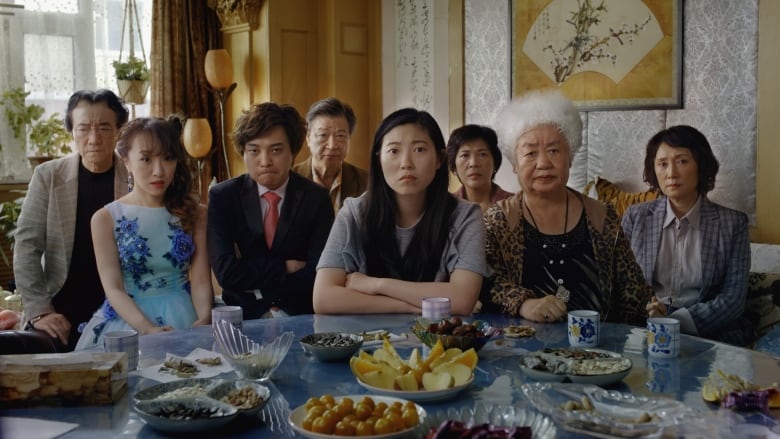#GoldOpen celebrations help uplift Asian representation onscreen — and that's a big deal
With a little help from Simu Liu, Toronto came together to support The Farewell

Fresh off the San Diego Comic-Con announcement of his Shang-Chi and the Legend of the Ten Rings casting as the title character, actor Simu Liu did what any self-respecting Asian superhero would do: use his power for good — but also find a way to make his parents proud while doing it.
After expressing what the role meant to him as a child of immigrants, Liu announced via Instagram that he had bought out two Tuesday night theatre screenings of Lulu Wang's The Farewell in Toronto — a generous gesture and a nod to his future Shang-Chi co-star, Awkwafina, organized in partnership with #GoldOpen. Gold Open is an Asian community movement started during the release of Crazy Rich Asians which saw theatres bought out by affluent members of the community both to ensure solid box office sales during opening week and, more importantly, to make the movie accessible. The movement has seen droves of Asian people head to the theatre to support Asian representation on the big screen, and Simu's screening was no different.

I took my mom and niece to see the film that night and was sitting in an earlier screening of The Farewell when a low buzz started building up toward the end of the movie. The sound was coming from the collective chatter of the snaking lineups for the #GoldOpen. Before heading out, I couldn't help but stop and join a conversation with people in line. A young Filipina woman told me she had heard about the free screening from Simu's social media, and said, "I feel like it's very hard to find films that have Asian representation. There's only been — what's it called, Joy Luck Club? And Crazy Rich Asians, but other than that there hasn't been much."
I remember specifically seeking out my oldest friend from my weekly Chinese school classes to see The Joy Luck Club when it came out in 1993. It was just the two of us, and while the numbers didn't compare to the #GoldOpen, we made an event out of it and felt that same palpable excitement. A movie set in the U.S. that starred Asian actors who weren't delivering takeout or running a laundromat and only spoke accented English because their characters were immigrants and had backstories? Where had this movie been all my life? I had grown up in Winnipeg, with only slivers of what I could barely call "representation" on TV. I still couldn't help but feel something akin to pride every time someone Asian graced the screen and actually had more than one line of dialogue — the servant Chau-Li on Falcon Crest; Kelly on M*A*S*H; even the grown woman sporting pigtails, yellow ribbons and matching cheongsam top in that cringey Calgon commercial.
Three years later in 1996, with little fanfare after the unprecedented premiere of The Joy Luck Club, my sole movie mate and I found a community at the Toronto Reel Asian International Film Festival screening of Yellow, featuring a young John Cho. We didn't have social media or even the luxury of three-way calling yet, but I did live down the street from the Bloor Cinema and that excitement from The Joy Luck Club came back when I saw Yellow on the schedule. Now in 2019, as the executive director of the Toronto Reel Asian International Film Festival, seeing Asians onscreen and advocating for their place in front and behind the camera is my full-time job. I even got to see Simu make his acting debut in an Unsung Voices short film in 2012 and later make and star in his own short film in 2013 through the same workshop program for aspiring filmmakers run by Reel Asian. Now he's a Marvel superhero — and the first Asian Canadian one at that!

Being Asian means and looks like a lot of different things, but it's nothing like what I used to watch on TV growing up. For me, it's the scene in The Farewell where Billi is speaking in English with a Chinese doctor about her grandmother's condition while she is in the room, and her grandmother seizes the opportunity to find out if the handsome young doctor is single. One of my family's own oft-repeated stories is how my Poh-poh once propositioned a Chinese Canadian doctor in the hallway of the hospital where she was waiting to be admitted following a heart attack. The biggest concern of her life was making sure my brother, who was an anaesthesiologist and also single, found a "nice Chinese girl" to settle down with. Lying on a gurney, she gripped the hand of the young, pretty doctor and uttered some of the only words of English that she knew: "My grandson — doctor!"
Being Asian means and looks like a lot of different things, but it's nothing like what I used to watch on TV growing up.- Deanna Wong
There is a truth to collectivism being ingrained in our DNA, but I don't think the support comes from an obligation to support the community — rather, it's an enthusiasm to see each other succeed. We've made strides but until recently, most of it has been done quietly and out of the mainstream. Even though we've been making spaces for ourselves for years, the demand to see more than a sliver of ourselves is outgrowing the supply — and now is the time to grab onto that momentum. I have every confidence in our community of Asian creators that they will do just that — and every time they do, I'll be the first one to stand and applaud.

